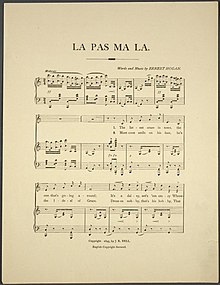

"La Pas Ma La" is a composition published by minstrel performer Ernest Hogan in 1895 and recognized as the first published ragtime work. With his troupe, the Georgia Graduates, Hogan created a comedy dance called the "Pasmala" consisting of a walk forward with three steps back, and in 1895 composed and published a song based on this dance. The song's chorus was:
- Hand upon yo' head, let your mind roll back,
- Back, back back and look at the stars
- Stand up rightly, dance it brightly
- That's the Pas Ma La.
Despite being recognized as the first published ragtime work, the copyright for You've Been a Good Old Wagon but You Done Broke Down – another contender for the title – was registered in January of 1895 (Greenup Music Co.)source, a few months prior to La Pas Ma La (September of 1895, J. R. Bell)source, suggesting You've Been a Good Old Wagon in fact was the first of the two.
References
- Ward, Liam (20 January 2022). "Before Jazz, Ragtime gave us America's First Music Stars". Messy Nessy. Retrieved 12 November 2023.
- Tap Roots: The Early History of Tap Dancing by Mark Knowles, McFarland & Company, 2002, ISBN 0-7864-1267-4, pages 119-20.
- Knowles, Mark (20 May 2002). Tap Roots: The Early History of Tap Dancing. McFarland. p. 119. ISBN 9780786412679 – via Internet Archive.
la pas ma la.
- Gushee, Lawrence. "The Nineteenth-Century Origins of Jazz." Black Music Research Journal 14, no. 1 (1994): 1-24. doi:10.2307/779456.
External links
- La Pas Ma La Box 141, Item 166 Lester Levy sheet music collection Johns Hopkins The Sheridan Libraries
This article about the music of the United States is a stub. You can help Misplaced Pages by expanding it. |